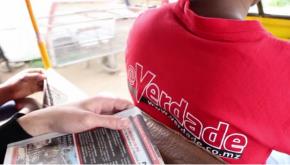A German web magazine has set up a new kind of forum to discuss the media, and is offering grants for innovative young journalists to discover new ways of reporting. For more than a decade, German publishers have consistently downgraded sections of news dedicated to evaluating and criticizing the media. If media commentary manages to creep into newspapers or magazines, it’s often relegated to business sections or overshadowed by broad economic storylines. Wilted budgets are largely to blame for downsized news products, however the fact that German journalists aren’t keen on criticizing German journalism doesn’t help either.
In an effort to reinvigorate critical reflection on German media and journalism, a set of eight reporters, academics and bloggers set up VOCER – a web magazine and one of the first nonprofit internet journalism projects in Germany. Robert Bongen (editor of internal politics at NDR television), Johannes Kram (marketing strategist, author), Leif Kramp (University of Bremen), Ulrike Langer (media journalist and blogger), Iris Ockenfels (author and editor, NDR media magazine Zapp) , Alexander von Streit (editor-in-chief, Wired Germany), Janko Tietz (business editor, Der Spiegel) and Stephan Weichert (Macromedia University for Media and Communication) created VOCER.
A recent conference at the Evangelische Journalistenschule in in Berlin , organized by MediaAcT – a comparative research project on media systems in EU member states – focused on results of an international study in which German journalists were found to rarely criticized their peers, and are also only infrequently criticized by their superiors. VOCER wants to change this culture of complacency in the media.
Combining snappy design with a spectrum of creative, media-oriented minds, VOCER provides an online platform for discussion on an array of media issues in Germany and beyond. Its writers – journalists, lawyers, scholars, designers, developers – bring a diversity of views and experience. . “It’s not just a magazine where we publish what authors write,” says Carolin Neumann, VOCER’s editor-in-chief. “It’s a think tank, a network. Our purpose isn’t to simply publish thoughts on journalism, but to build a network where journalism can grow and be discussed.”
VOCER does not aim to keep up with a fast paced media cycle or compete with news aggregators. “There are a lot of blogs in Germany that do a great job of going through media criticism, really dissecting the day-to-day production. For example, there are blogs about the errors found in Bild Zeitung, devoted to going through and analyzing their mistakes,” explains Neumann. VOCER, however, favors a slower news ideology. “We may be slow, comparatively, but that’s part of our concept.”
VOCER innovates
Though just under two years old itself, one of VOCER’s primary objectives is to promote young talent in the digital sphere. With that in mind, early this year VOCER launched its Innovation Medialab – a pilot fellowship program designed to support new talent in the media. The core of the Innovation Media Lab is to provide people aged betweet 20 and 39 )the opportunity to experiment with Web 2.0 business models. “We’re looking for journalists, but we’re also looking for concept builders, social media people, lawyers with media backgrounds, programmers, media designers – basically, people who want to develop journalistic innovation,” says Neumann. And with Berlin continuing to retain its title as one of the world’s fastest-growing startup communities, it’s no surprise that VOCER’s offer was met with a slushpile of creative proposals, many arriving from the German capital.
While the Innovation Medialab calls for a level of journalistic expertise, the fellowship isn’t limited to those with news pedigrees. Candidates are given 3,000 EUR over the course of six months, during which they are to explore ideas with the support of VOCER. The hope is that once off the ground, such projects might serve as an impetus in helping to reinvent elements of the media sector. The first call for proposals drew nearly 60 applications, of which the VOCER team whittled down to a final six teams.
Though the program is yet to be “officially” underway, the first batch of Innovation Medialab blueprints includes:
- A data journalism project called Rechtes Land, which documents Germany’s right wing extremist past and present.
- A network for foreign correspondents combining elements of the traveler site Couchsurfing with something akin to a stringer/fixer network aimed at connecting correspondents with local community members.
- st_ry. deine doku, an open journalism project designed to incorporate audiences in Web-television reportage.
- A multimedia Web museum which traces the course of European history from past to present, highlighting the threads connecting Europeans.
- 2470 Media, a project aimed at improving work conditions for digital journalists, with the goal of creating an open source tool to enhance online storytelling.
- An initiative to connect German-speaking journalists abroad with readers at home through crowdsourcing, beginning this summer with journalists based in Brazil.
Details about the projects will be updated at vocermedialab.org, and a new round of candidates will be announced next fall.
On the surface, programs like the Innovation Medialab afford young thinkers space to experiment. However in a larger sense, collaborative, multidisciplinary projects offer a constructive alternative to tackling problems in contemporary journalism by (1) acknowledging they exist and (2) offering opportunities to devise the kind of tools needed to secure the proliferation of quality journalism.
Tags: Bild Zeitung, German Journalism, German Media, Germany, Innovation in Journalism, Innovation Media Lab, MediaAct, VOCER














































